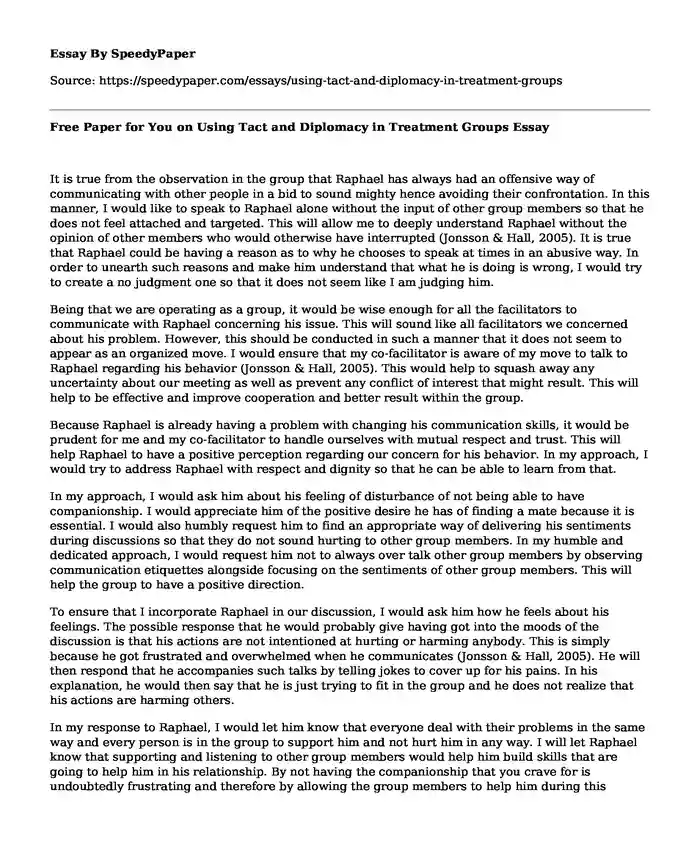
| Type of paper: | Case study |
| Categories: | Communication skills |
| Pages: | 3 |
| Wordcount: | 679 words |
It is true from the observation in the group that Raphael has always had an offensive way of communicating with other people in a bid to sound mighty hence avoiding their confrontation. In this manner, I would like to speak to Raphael alone without the input of other group members so that he does not feel attached and targeted. This will allow me to deeply understand Raphael without the opinion of other members who would otherwise have interrupted (Jonsson & Hall, 2005). It is true that Raphael could be having a reason as to why he chooses to speak at times in an abusive way. In order to unearth such reasons and make him understand that what he is doing is wrong, I would try to create a no judgment one so that it does not seem like I am judging him.
Being that we are operating as a group, it would be wise enough for all the facilitators to communicate with Raphael concerning his issue. This will sound like all facilitators we concerned about his problem. However, this should be conducted in such a manner that it does not seem to appear as an organized move. I would ensure that my co-facilitator is aware of my move to talk to Raphael regarding his behavior (Jonsson & Hall, 2005). This would help to squash away any uncertainty about our meeting as well as prevent any conflict of interest that might result. This will help to be effective and improve cooperation and better result within the group.
Because Raphael is already having a problem with changing his communication skills, it would be prudent for me and my co-facilitator to handle ourselves with mutual respect and trust. This will help Raphael to have a positive perception regarding our concern for his behavior. In my approach, I would try to address Raphael with respect and dignity so that he can be able to learn from that.
In my approach, I would ask him about his feeling of disturbance of not being able to have companionship. I would appreciate him of the positive desire he has of finding a mate because it is essential. I would also humbly request him to find an appropriate way of delivering his sentiments during discussions so that they do not sound hurting to other group members. In my humble and dedicated approach, I would request him not to always over talk other group members by observing communication etiquettes alongside focusing on the sentiments of other group members. This will help the group to have a positive direction.
To ensure that I incorporate Raphael in our discussion, I would ask him how he feels about his feelings. The possible response that he would probably give having got into the moods of the discussion is that his actions are not intentioned at hurting or harming anybody. This is simply because he got frustrated and overwhelmed when he communicates (Jonsson & Hall, 2005). He will then respond that he accompanies such talks by telling jokes to cover up for his pains. In his explanation, he would then say that he is just trying to fit in the group and he does not realize that his actions are harming others.
In my response to Raphael, I would let him know that everyone deal with their problems in the same way and every person is in the group to support him and not hurt him in any way. I will let Raphael know that supporting and listening to other group members would help him build skills that are going to help him in his relationship. By not having the companionship that you crave for is undoubtedly frustrating and therefore by allowing the group members to help him during this difficult time could help him do away with some frustration. As a group, therefore, it is crucial for Raphael to gain all the necessary skills that he needs so that he will be able to build a healthy relationship in the future.
Reference List
Jonsson, C., & Hall, M. (2005). The essence of diplomacy. Springer.
Cite this page
Free Paper for You on Using Tact and Diplomacy in Treatment Groups. (2022, Jul 29). Retrieved from https://speedypaper.net/essays/using-tact-and-diplomacy-in-treatment-groups
Request Removal
If you are the original author of this essay and no longer wish to have it published on the SpeedyPaper website, please click below to request its removal:
- Free Essay Sample on the Bargaining Hypothesis and Politics
- Education Requires Sacrifice, Essay Example
- Essay Example: Effects of the Use of Nanotechnology in Concrete
- Free Essay Sample about Enhancing Health Care Using Delphi Method
- Issues at Ishbilia Compound - Free Essay in Human Resources Management
- Nutrition Essay Example from Our Collection
- Essay Sample on Meniere Infection
Popular categories




